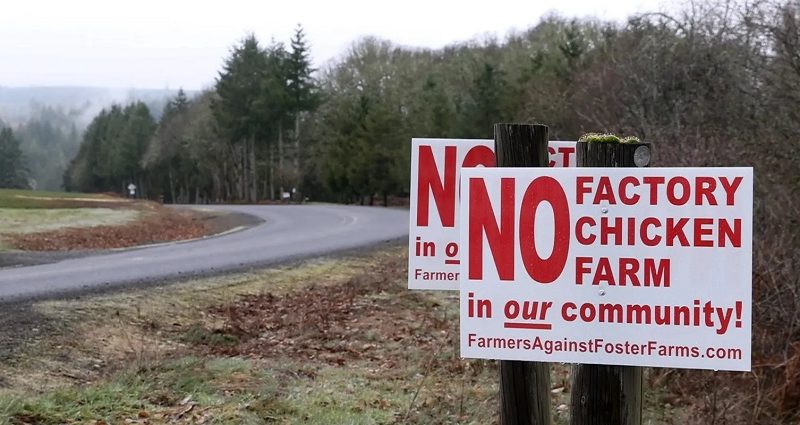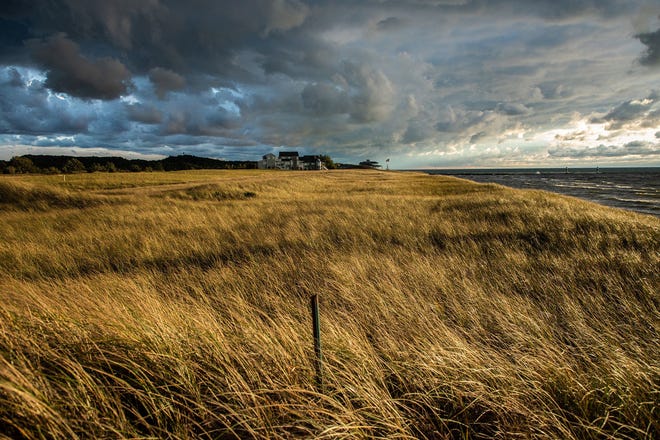Salem, OR – A coalition of local residents and farm groups has filed a legal challenge against a newly issued permit for a large chicken farm in Linn County, Oregon. The petition, submitted earlier this week to the Linn County Circuit Court, seeks to overturn the state-issued permit for J-S Ranch, a proposed confined animal feeding operation (CAFO) near the town of Scio.
The legal challenge is the latest chapter in a protracted battle between local communities and the Oregon Department of Agriculture (ODA), which has approved the farm’s plans despite ongoing concerns from residents about potential environmental damage. Opponents argue that the farm, which plans to raise 3.4 million broiler chickens annually in 11 large barns on a 60-acre property, poses serious risks to local water quality and the health of the surrounding environment.
Concerns Over Water Pollution and Ammonia Emissions
The primary concern raised by critics of the project is the potential for water pollution, particularly from ammonia and manure runoff, which could contaminate drinking water and nearby rivers. The farm is located just a quarter-mile from the North Santiam River, a crucial water source for the region.
Amy van Saun, an attorney with the nonprofit Center for Food Safety, which is representing local residents and farmers, argues that the farm could endanger the local ecosystem. “We shouldn’t be opening new factory farms,” she said. “We should be transitioning away from that manner of raising animals into one that is truly sustainable and restorative, rather than exploitative of the land and the communities that they’re in.”
Ammonia emissions from the chicken barns are another focal point of concern. Local farmers and environmental groups worry that ammonia could settle into the soil and waterways, including the North Santiam River, threatening water quality and local agriculture. The farm is required to install underground moisture sensors to monitor the area’s water usage, but critics argue that the permit fails to include adequate measures to monitor surface water quality for manure runoff.
State’s Revised Permit and Legal Backdrop
The latest legal challenge comes after a previous version of the farm’s permit was temporarily withdrawn in response to public opposition and a potential court challenge. Following a review, the Oregon Department of Agriculture (ODA) and the Oregon Department of Environmental Quality (DEQ) reissued the permit in November, allowing J-S Ranch to proceed with its plans under the conditions of a confined animal feeding operation (CAFO) water quality permit.
The CAFO permit is designed to limit the discharge of manure, wastewater, and nutrients that could impact local water systems. However, local residents and environmental advocates argue that the revised permit does not fully address their concerns, particularly the potential for ammonia emissions to pollute the nearby river.
In addition, critics contend that the farm’s operations violate the spirit of Senate Bill 85, which was signed into law by Governor Tina Kotek in 2023. The law includes stricter regulations for large CAFOs, including enhanced water use and construction requirements. Van Saun and other opponents of the farm’s expansion claim that the modified permit does not adequately comply with these new standards.
Support for the Farm
On the other side of the debate, supporters of the chicken farm argue that it is a necessary development to meet the growing demand for poultry in the Pacific Northwest. Currently, much of the chicken consumed in the region is transported from other parts of the country. Industry groups advocate for farms like J-S Ranch as a way to increase local production and reduce reliance on out-of-state suppliers.
Eric Simon, the owner of J-S Ranch and a longtime chicken farmer, expressed confidence that the state’s revised permit would hold up in court. “I know the state Department of Agriculture put a lot of time and effort into making sure that they really made something that was truly defensible in court,” he said. “I’m confident that the state has addressed whatever may come up.”
The Road Ahead
As the legal battle continues, both sides remain entrenched in their positions. Opponents of the farm argue that the state’s permitting process failed to fully consider the long-term environmental and health risks posed by large-scale industrial farming. Meanwhile, proponents contend that the farm is a necessary step toward meeting regional food production needs and reducing dependence on external sources.
The outcome of this legal challenge could set a significant precedent for how future CAFOs are permitted and regulated in Oregon, particularly in terms of their environmental impact and their compliance with evolving state laws like Senate Bill 85. As the case moves through the courts, the future of J-S Ranch—and the broader debate over industrial agriculture in the Willamette Valley—remains uncertain.











